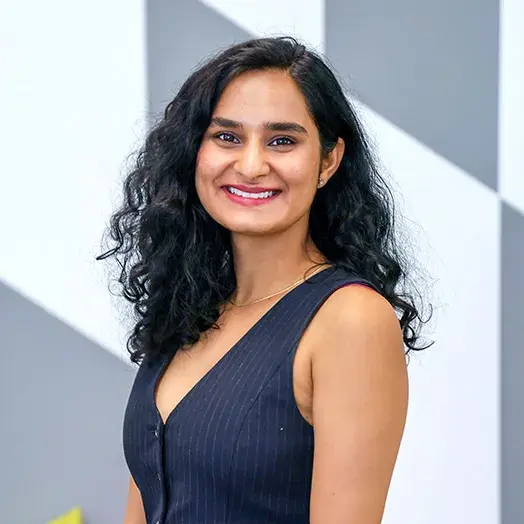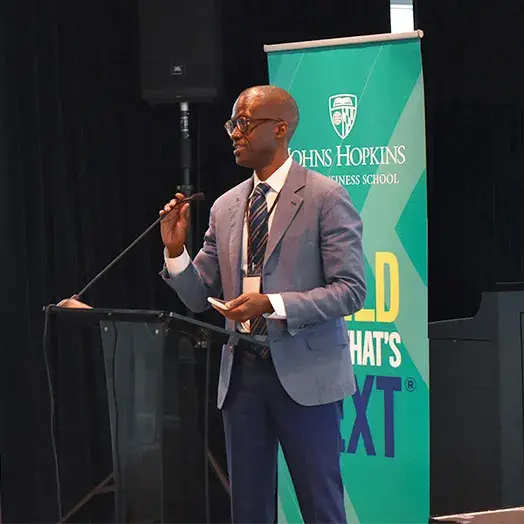Just days before she graduated, Prem Umang Satyavolu (MBA ’25), learned that her company, Modelus, had won the President’s Venture Fellowship - a $100,000 investment in the company, and a $40,000 stipend for her as project lead.

Carey alumna’s award-winning company uses AI to advance life-saving research
Prem Umang Satyavolu (MBA ’25) knows a lot about organoids. With a background in clinical counseling and research related to brain biology, she came to the Johns Hopkins Carey Business School thinking she would develop a business related to transdermal drug delivery. Instead, guided by mentors from Carey and the Pava Marie LaPere Center for Entrepreneurship, and lessons learned during the customer discovery process, she pivoted to a venture that uses artificial intelligence to help scientists use organoids in clinical trials.
Just days before she graduated, Satyavolu, 28, learned that her company and team, Modelus, had won the President’s Venture Fellowship, receiving a $100,000 investment. As project lead, Satyavolu also received a $40,000 stipend.
This is the third year of the PVF, a highly competitive award funded by the Office of the President with generous alumni support. It’s given to one or two Johns Hopkins teams per year, to use toward building a Baltimore-based business after graduating.
Pava Director Josh Ambrose says the Modelus team “impressed the reviewers with their market potential, their development to date, and their strategic responses to extensive customer discovery.”
Testing organoids instead of animals
The goal of Modelus is to help researchers use organoids more efficiently and effectively, with a user-friendly platform that supports better decision-making in drug discovery and enhances experimental standardization for clearer, more reproducible results.
As Satyavolu explains, a growing number of researchers have begun using organoids instead of animals for clinical trials. This innovation, only about 10 years old, uses human stem cells to grow organs such as livers or kidneys in petri dishes, for use in drug testing. Because organoids are biologically human, they have a major advantage over clinical trials involving animals, which have a high failure rate when translating the findings to people.
However, organoids are structurally complex, with tremendous variation between batches. “There are a lot of issues that come, not only with manufacturing organoids, but with testing the drugs as well, which leads to flawed decisions and wasted resources,” Satyavolu says.
Modelus can help, she says, by providing “reliable, actionable insight for confident drug discovery.”
In addition, Satyavolu notes, the platform supports researchers during both the manufacturing and testing phases of organoid use, helping ensure greater consistency across batches. “By improving normalization early on, we enable more reliable comparisons during drug testing,” she says. “That means researchers can identify potential issues sooner, avoid costly false leads, and generate stronger, more cohesive data to support their regulatory submissions.”
Satyavolu sees a robust market for the product, with a growing number of scientists relying on organoids instead of animals in their research. She noted that the FDA recently began approving drugs that have been tested only on organoids, not on animals.
Pivots and progress
Satyavolu grew up in India and Chicago, and earned her undergraduate degree in psychology at the Dayalbagh Educational Institute in India before coming to Johns Hopkins for a master’s in clinical counseling at the school of education. She then worked as a research program coordinator at Johns Hopkins Medicine, learning about interactions between opioids and pain, schizophrenia, and addiction.
She thought about pursuing a PhD, but after deciding that “the scale of the impact I wanted might be easier through an MBA or startup,” she got into Carey with a full scholarship, determined to start a business with broad real-world benefits.
“From the very beginning, I thought, ‘this is the time to try things,’” Satyavolu says.
Her initial idea was related to transdermal drug delivery, but “after a lot of customer discovery,” she pivoted to organoids, recognizing that “one of the biggest pain points that we came across was that a lot of what they use is very coding-heavy, and some of these scientists don't have a coding background. Our goal is to make it easier for them to develop new drugs quickly in order to bring better treatments to those who need them most.”
What to Read Next

business of health
Healthier cities are key to a healthier planet and healthier peopleSatyavolu worked closely with the Pava Center to develop her idea over the course of eight months. “They have been everything that we needed,” she says, starting with the Spark accelerator program – “a very rigid curriculum, week on week, that helped us through customer discovery, idea validation, and making sure that we were pitch ready.”
When Satyavolu found out about the President’s Venture Fund, “that became the goal,” she says. The winning funds will be used to start pilot programs with Johns Hopkins laboratories, as well as private manufacturers.
“We’re hoping the labs in these pilot programs will eventually turn into our customers,” she says. “We want our differentiating factor to be the customizability and the ease of usability of the platform.”
It’s a long way from where Satyavolu thought she’d be years ago, when embarking on a psychology degree, but she has absorbed a crucial lesson about the value of the pivot.
“I was actually just telling my family that the Prem Umang who started her undergraduate education did not see herself here at 28,” she says. “It’s a very humbling and happy surprise.”


